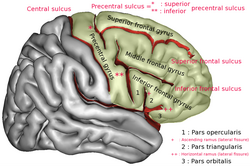Frontal gyri
| Frontal gyri | |
|---|---|
 | |
| Details | |
| Part of | Frontal lobe |
| Parts | Inferior, Medial, Middle and Superior |
| Identifiers | |
| Latin | gyri frontalis |
| Anatomical terms of neuroanatomy | |
The frontal gyri are four gyri of the frontal lobe in the brain. These are four horizontally oriented, parallel convolutions, of the frontal lobe. The other main gyrus of the frontal lobe is the precentral gyrus which is vertically oriented, and runs parallel with the precentral sulcus.
The uppermost of the four gyri is the superior frontal gyrus, below this is the middle frontal gyrus, and below this is the inferior frontal gyrus. Continuing from the superior frontal gyrus on the lateral surface, into the uppermost part of the medial surface of the hemisphere is the medial frontal gyrus. The inferior frontal gyrus includes Broca's area.[1] The lowest part of the inferior frontal gyrus rests on the orbital part of the frontal bone.
Gyri
[edit]
Superior
[edit]The superior frontal gyrus makes up about a third of the frontal lobe. It is bounded laterally by the superior frontal sulcus.
Medial
[edit]This section is empty. You can help by adding to it. (March 2020) |
Middle
[edit]It has been recently found that this region participates during linguistic tasks. More precisely, during interactive communication it is active during a phase of response planning.[2]
Inferior
[edit]The inferior frontal gyrus includes Broca's area.[3]
References
[edit]- ^ Boisgueheneuc, F. d.; Levy, R.; Volle, E.; Seassau, M.; Duffau, H.; Kinkingnehun, S.; Samson, Y.; Zhang, S.; Dubois, B. (2006-12-01). "Functions of the left superior frontal gyrus in humans: a lesion study". Brain. 129 (12): 3315–3328. doi:10.1093/brain/awl244. ISSN 0006-8950. PMID 16984899.
- ^ M. Long, Castellucci (2022). "A speech planning network for interactive language use". Nature. 602 (7895): 117–122. Bibcode:2022Natur.602..117C. doi:10.1038/s41586-021-04270-z. PMC 9990513. PMID 34987226. S2CID 245771009.
- ^ Grodzinsky, Yosef; Amunts, Katrin (2006-04-20). Broca's Region. Oxford University Press. ISBN 9780198039525.
